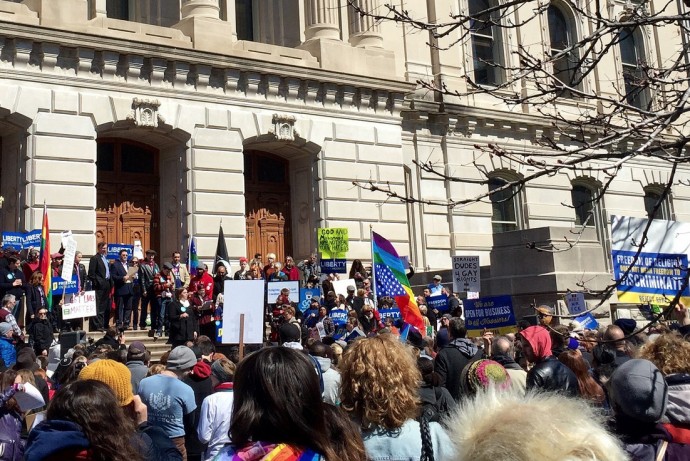As a fellow religion scholar I respect Stephen Prothero enormously—he has done so much, throughout his career, to deepen conversations about religion in the United States. But when I read his take on Indiana at the height of the public controversy I was stunned. I have to say that he couldn’t have been more staggeringly, spectacularly, dead-bang wrong on Indiana’s SB 101.
Why revisit this now?
Because the dust may have settled on Indiana’s RFRA, with an April 2 revision to the legislation, but the political struggle continues.
“Indiana’s Religious Freedom Restoration Act (RFRA) may have grabbed the most attention, but it’s just scratching the surface,” Peter Montgomery reported last week. In fact, as he reminds us, Republican lawmakers have introduced more than 25 RFRA bills as of early April.
So I’d like to return to Indiana for a moment, and to the contentious public discussion around “religious freedom” that it engendered.
In an op-ed written for USA Today, Prothero argued that “Indiana needs to balance gay [and] religious rights,” and that the original version of the state’s RFRA “simply [offered] religious minorities a day in court.”
As he said: “Our battles over ‘family values’ are threatening to kill religious liberty. And liberals do not much seem to care.”
It’s obvious at once from his rhetoric that Prothero is on shaky ground: instead of offering any justifications of substance for SB 101, he resorts to scolding. He supports both gay rights and religious liberty, he says: “but it is a sad day when there is so little support for the liberties of U.S. citizens, especially among liberals who should be their staunchest defenders.” Later, Prothero acknowledges that his “liberal friends” have a right to disagree with him. “But in my view the Old Order Amish have an equally fundamental right to drive their horse-drawn buggies on Indiana roads,” he continues. “So do Muslim students in Indianapolis public schools who want to be released from class in order to celebrate their Eid al-Adha festival.”
So if you don’t support SB 101 in particular that makes you insufficiently supportive of U.S. citizens’ liberties in general? If you don’t agree with Prothero that means you’re against rights of Amish farmers and Muslim schoolchildren that in no way impinge upon the rights of others? This makes no sense—and if there were a stronger case to be made the piece wouldn’t need to rely on such false equivalencies.
Prothero’s language also makes no allowances for a hugely important reality: that there are people who support religious liberty but think that SB 101 (in its original and/or current revised form) is a terrible, harmful way to express that support. These people certainly do exist both within and without the Hoosier State. Consider, for example, the card-carrying members and staff of the American Civil Liberties Union, the nonpartisan organization that exists exclusively to “defend and preserve the individual rights and liberties guaranteed to every person in this country by the Constitution and laws of the United States.”
The ACLU often tries to resolve the same tensions between religious freedoms and civil rights that Prothero alludes to. In this instance, the organization, which has a long and impressive track record of work seeking to “guarantee that all are free to follow and practice their faith – or no faith at all – without governmental influence or interference,” came out against SB 101 at both the local and national level. In an op-ed for the Indianapolis Star, the American Civil Liberties Union of Indiana’s executive director, Jane Heneger, writes:
The ACLU will be the first to defend a church that is threatened or forced by the government to perform a marriage ceremony or any other religious ritual. But such government action hasn’t happened and is unlikely to happen. [SB 101] is a solution in search of a problem. Across the nation, the ACLU has fought for decades to defend religious freedom. But, while the freedom to hold religious beliefs and opinions is absolute, the freedom to act pursuant to one’s religion is not.
The conversation about religious freedom in Indiana has revealed confusion about not only this point, but also the very significant differences between the federal Religious Freedom Restoration Act and SB 101 and other states’ RFRAs. They have both similarities and profound dissimilarities, and these have not been well articulated, especially by the news media. As the Center for American Progress notes:
[The federal RFRA was] enacted in 1993 in response to concerns that previous Supreme Court cases removed adequate protections for religious exercise, particularly those of minority religious groups. [It] sets out the conditions under which the free exercise of religion is protected. First, objectors must show that a law substantially burdens the exercise of their religious beliefs. Second, the government must show that it has a compelling interest in enforcing the law in question—and is doing so in the least restrictive way possible.Many of the proposed state RFRAs are broader in scope than the federal RFRA. Last June, the U.S. Supreme Court’s Sebelius v. Hobby Lobby Stores, Inc. ruling also extended RFRA protections to for-profit corporations, an application unintended by drafters of the original legislation.
MSNBC points out that SB 101 is “the first [state RFRA] of its kind that explicitly recognizes corporations as religious,” and that the text of the law redefines a “person” (“whose religious beliefs may not be substantially burdened by a governmental action without a compelling state interest and in the least restrictive means”) to include “a partnership, a limited liability company, a corporation, a company, a firm, a society, a joint-stock company, an unincorporated association.”
Prothero concedes this especially troubling aspect of the original law, saying, “admittedly, there are problems with Indiana’s RFRA.” However, he can’t resist adding, “But few liberals are up in arms about that.” I just quoted no less than MSNBC and the Center for American Progress on this very point above, and you’ll find much more at such liberal bastions as The Nation and Mother Jones, and other outlets.
So who exactly are these liberals that Prothero is talking about? It’s anybody’s guess. This is an especially confusing aspect of the op-ed; at a certain point in the piece, his “liberal friends” (whoever they are) get conflated with liberals across the board, though it does not seem that they are one and the same. Perhaps he was hoping no one would notice?
Later in the piece, Prothero observes the distinction between the federal RFRA and the states’, referring to the latter collectively as “mini-RFRAs” (yes and no). But he eventually over-blurs the line by saying, “Recently the Supreme Court employed the RFRA test to allow a Muslim prisoner to wear a beard and in Pennsylvania that same test was used to allow churches to feed the homeless in city parks.”
Elsewhere, on social media, Prothero shared an article from USA Today, entitled “8 Ways RFRA Stopped Discrimination” (or, as he suggests, “Who Is Being Thrown Under [the] Bus in [the] Push Against Religious Liberty”). That piece confuses things badly enough to include the phrase “when Indiana passed the legislation last week,” failing to differentiate the federal RFRA from SB 101 at all (italics mine).
Again, the federal RFRA, SB 101, and other states’ RFRAs are not identical just because they all use the moniker “Religious Freedom Restoration Act.” In fact, “not all RFRAs are created equal,” as Aaron Weaver wrote recently for a Religion News Service blog: “If [SB 101’s] conservative champions were truth tellers and not trading in deception trying to pretend the Indiana RFRA is the same as the federal RFRA, they’d acknowledge that the goal is not to restore a long-standing religious freedom standard, but to rig the process to better ensure a desired result — a result that most recognize as discrimination.”
But here’s where Prothero really disagrees, writing:
The left sees this law as a blank check to discriminate. But RFRAs are not blank checks. They simply offer religious minorities a day in court, and only rarely do these cases concern gay rights.
In making categorical statements about RFRAs and saying “rarely do these cases concern gay rights,” he’s once again basing his argument on the incorrect assumption that all RFRAs are the same. Furthermore, at the time that he wrote his op-ed, Prothero could not actually assert that SB 101 would “rarely” concern gay rights because, before the revision, it was a law that has no comparable precedent in very significant ways. If he’s going to insist on comparing Indiana’s law with the federal RFRA or other states’ laws anyway, then he really ought to make the requisite qualifications about how precisely they all differ.
Of course, looking at the original version of Indiana’s law makes plain proponents’ true intentions – specifically, the portion that reads, “a person whose exercise of religion has been substantially burdened, or is likely to be substantially burdened, by a violation of this chapter may assert the violation or impending violation as a claim or defense in a judicial or administrative proceeding, regardless of whether the state or any other governmental entity is a party to the proceeding.” As University of Baltimore law professor and Atlantic contributing editor Garrett Epps notes, “Neither the federal RFRA, nor 18 of the 19 state statutes cited by the [Washington Post], says anything like this; only the Texas RFRA, passed in 1999, contains similar language.” Why this flourish in Indiana’s original version of the law, then? In Epps’s view, making “a business’s ‘free exercise’ right a defense against a private lawsuit by another person, rather than simply against actions brought by government” (as in the Hobby Lobby case) was “impelled, at least in part, by a panic over a New Mexico state-court decision, Elane Photography v. Willock.” He continues:
In that case, a same-sex couple sued a professional photography studio that refused to photograph the couple’s wedding. New Mexico law bars discrimination in “public accommodations” on the basis of sexual orientation. The studio said that New Mexico’s RFRA nonetheless barred the suit; but the state’s Supreme Court held that the RFRA did not apply “because the government is not a party.”
Remarkably enough, soon after, language found its way into the Indiana statute to make sure that no Indiana court could ever make a similar decision. Democrats also offered the Republican legislative majority a chance to amend the new act to say that it did not permit businesses to discriminate; they voted that amendment down.
If Prothero is still not convinced that SB 101 was initially meant to do anything other than “simply offer religious minorities their day in court,” he might consider the fact that among the few dozen people who attended the private ceremony in which Pence signed the bill into law were “the state’s three most prominent lobbyists on conservative social issues”: Micah Clark of the American Family Association of Indiana, Curt Smith of the Indiana Family Institute, and Eric Miller of Advance America. GLAAD has extensive records on each as part of their Commentator Accountability Project, including the “extreme anti-LGBT comments they have made [publicly],” and The Indianapolis Star points out that they were also “three of the lobbyists who pushed hardest for last year’s gay marriage ban” in Indiana.
In addition, less than a week after SB 101’s passage, Memories Pizza in Walkerton, IN, publicly announced its intention to refuse service to same-sex couples. The ink on the bill wasn’t even dry before it began raising serious questions about public accommodations and the civil liberties of LGBTQI people in Indiana – “rarely do these cases concern gay rights,” indeed!
As Slate’s Micah Schwartzman, Nelson Tebbe, and Robert Tuttle put it, of course “Indiana’s new law allows discrimination. That was the point.” The conspicuous wrongness of the suggestion that there were or are no ulterior motives behind SB 101, and fallacious insistence that it “simply [offers] religious minorities their day in court,” do no favors for the cause of religious liberty.
Prothero has often been an eloquent and passionate supporter of that freedom, but in this instance he’s blowing his formidable credibility on those who would hijack his and others’ cherished ideals. He would do well to heed the wisdom of E.J. Dionne, who presages that allowing religious liberty to be turned into “a sweeping slogan that can be invoked to resist any social change that some group of Americans doesn’t like will create a backlash against all efforts at accommodating religion,” and that defending indefensible RFRAs like Indiana’s is “bad for the brand of religious liberty.”
“Let’s not let culture warriors, on either side, sacrifice our freedoms on the altar of the culture wars,” Prothero implores readers. OK, but to do that we’re probably all going to have to take a sober look, not a starry-eyed one, at the federal RFRA and what it has wrought. To ennoble the federal RFRA, SB 101, or other states’ RFRAs to the degree that only the uncritical acceptance of them equals honoring religious liberty is both misguided and lacking in imagination.
Even intellectual rock stars don’t always get it right, and, on the issue of SB 101, Stephen Prothero is wide of the mark.





